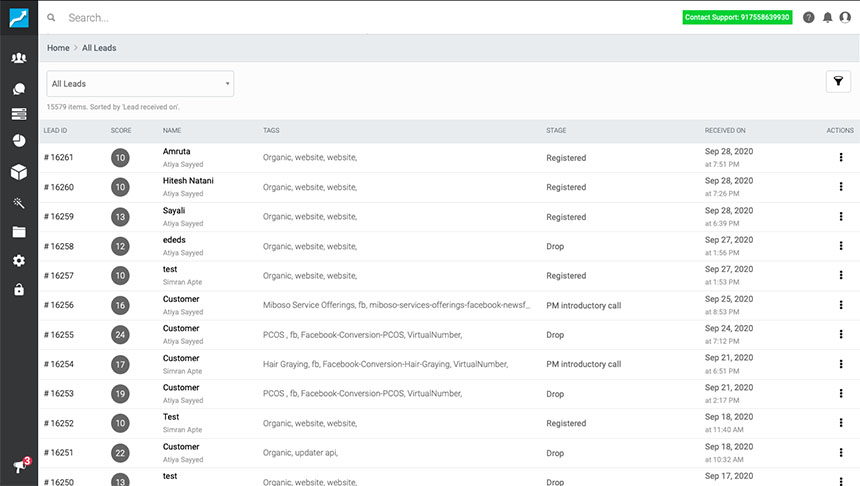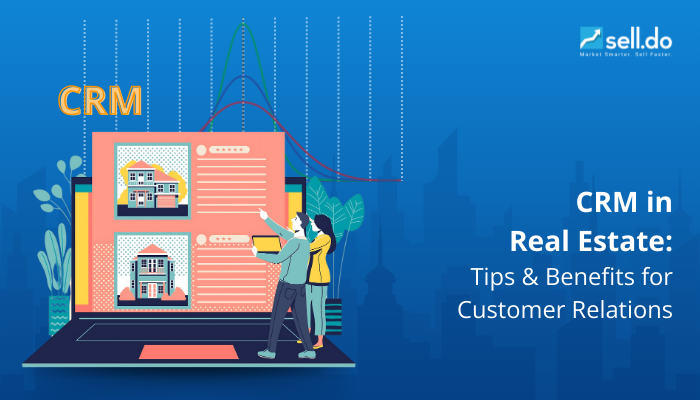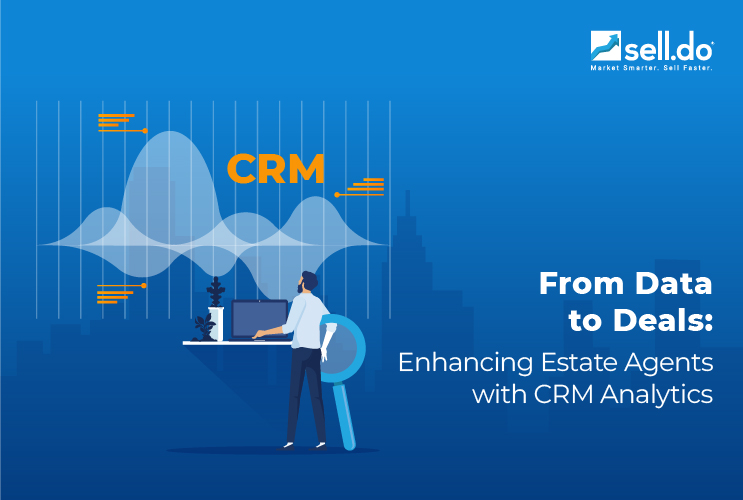Handling client interactions, property listings, and marketing efforts in real estate can be challenging. You might find it difficult to handle an influx of customer information. It can result in missed opportunities and unhappy customers.
A CRM system is very useful in this situation. According to Nucleus Research, CRM pays back $8.71 for every dollar spent. How does this work? A CRM for real estate centralizes customer information and automates mundane tasks. This boosts efficiency and enhances your ability to deliver personalized experiences. In turn, it helps maximize your return on investment.
In this article, you'll learn how real estate customer management can help you optimize your procedures and improve client connections. We'll look at practical tips and important benefits. This will allow you to get the most out of this valuable tool.
So, let's get started!
What is a CRM in Real Estate?
A CRM in real estate is a tool that helps you manage all aspects of client relationships and property transactions. Simply put, the CRM definition of real estate is a system that keeps track of your clients, properties, and interactions in one place.
Here are the key features:
- Client Interaction Management: Keeps all your communications with clients organized.
- Property Listing Management: Stores and updates information about properties.
- Agent Performance Monitoring: It helps you track how well your agents are performing.
- Marketing Strategy Support: Automates tasks like follow-ups and sends personalized messages.
In short, CRM in real estate is about making your work easier and improving how you interact with clients.
Now, let's explore how these benefits can make a real difference in your day-to-day operations.
Key Benefits of Using a Real Estate CRM
A real estate customer management platform is more than just a tool; it can transform how you manage your business. It collects all of your leads, contacts, documentation, and transactions in one location. This consolidated approach streamlines your process and keeps things organized.
Furthermore, a CRM improves your productivity by streamlining processes and automating repetitive work. This means you can devote more time to what is most important: developing relationships and closing sales.
Now, let's take a closer look at the perks.

Streamlined Customer Management
A CRM simplifies efficient customer management, which is crucial in real estate. The first step in real estate customer relationship management is to organize data. A CRM centralizes all of your client data, making it easier to store and access. No more sifting through files or losing track of crucial information.
Furthermore, a CRM enables personalization. You can personalize your interactions depending on your client's preferences and history, making your communications more relevant and effective.
Using the best CRMs for real estate simplifies these processes, making your job comfortable and increasing customer happiness. This all contributes to a more organized, efficient, and client-centered approach.
Enhanced Lead Management
Effective lead management is essential for building your real estate firm, and a CRM makes it easier. Lead capture is the first step. Depending on its integration capabilities, a real estate customer management platform can often be configured to gather and track leads from various sources, including your website, social media, and marketing initiatives. This will help you retain potential customers.
Automation simplifies the procedure even more. A real estate customer management platform can automatically harvest leads from many channels, saving you from manually doing it. This improves your response speed and keeps you ahead of the competition.
Once you have leads, lead nurturing is essential. A CRM allows you to follow up and keep in touch with potential clients via automated, personalized messaging. This keeps you linked and boosts your chances of converting leads to customers.
You can better manage and nurture your leads by employing CRM software for real estate.
Automated Communication
One of the most important processes in a real estate transaction is effective communication. A real estate CRM can automate much of it for you. Email and SMS automation allows you to send messages and notifications without needing to do it manually. CRM can send emails and SMS to keep customers informed and engaged.
Follow-ups and reminders are critical to sustaining successful client connections. CRM systems are designed to handle follow-ups, appointment reminders, and property updates according to the schedule you specify. This significantly reduces the chances of missing an opportunity to communicate with a client or update them on crucial information.
Finally, consistent communication facilitates relationship development. By automating messaging, you can maintain regular contact with clients. Consistent interaction allows you to create and sustain solid, long-term relationships.
Improved Marketing Campaigns
A real estate customer management platform helps you run targeted marketing campaigns more effectively. With the right tools, you can create and manage campaigns that reach the right audience.
Customer segmentation is another key feature of CRM, as it can divide your audience based on location, property preferences, and other important criteria. This ensures your messages are tailored to each group's interests and needs.
Content delivery becomes more efficient with a CRM in the real estate industry. It helps you send relevant content to the right people at the right time. This not only improves engagement but also enhances your overall marketing effectiveness.
By using marketing automation and lead nurturing tools, you can streamline your campaigns and see better results. Real estate CRM will ensure that your marketing efforts are well-targeted and productive.

Efficient Transaction Management
One of the major tasks of real estate is managing transactions. A CRM simplifies task management by helping you organize tasks, store documents, and keep everything in one place. This streamlines your workflow and reduces clutter.
You can set deadline reminders to ensure you never miss an important date. These reminders help you coordinate tasks efficiently, keeping your transactions on track and avoiding last-minute scrambles.
The CRM also significantly reduces the risk of missed deadlines and misplaced documents. With everything organized and accessible, you can minimize errors and avoid delays. This makes your transaction management more reliable and efficient.
By integrating sales automation and focusing on sales performance measurement, CRM optimizes transaction handling. This ensures smooth coordination and enhances your overall efficiency in managing transactions.
Performance Tracking and Analytics
Tracking performance is key to improving your real estate business. With analytics tools in CRM, you can monitor key performance metrics and track various business activities. These tools provide valuable insights into how well your operations are running.
By analyzing the data, you can identify areas for improvement. This helps you pinpoint where things might be falling short and allows you to make informed decisions to enhance your processes.
Optimization is another crucial aspect. CRM helps you allocate resources more effectively by showing where they are most needed. It makes sure that you put your efforts into areas that will yield the best results.
You can focus on analytics and optimization to make data-driven decisions that drive your business forward.
You can focus on analytics and optimization to maximize the return on your CRM investment. To put these benefits into action, we will now look at practical tips for using your CRM in real estate.
Tips for Using a Real Estate CRM

To successfully implement a CRM, you need to follow the best practices. Here are some important tips for maximizing the benefits of your real estate customer management platform.
Customization
Align the CRM system with your business's procedures. Customizing the CRM to meet your requirements guarantees that you make the most of the technology. To achieve the best results, tailor the capabilities to your company's specific requirements.
Data Management
To ensure that your data remains valid and suitable, import and clean it on a regular basis. This is critical for making sound judgments and offering individualized service to your customers. Accurate data is the foundation for successful customer relationship management.
Integration
Integrate CRM with additional tools, such as email marketing and social media channels. This seamless connection guarantees that all of your products work together to optimize your workflow management, boosting efficiency and productivity.
Training
Onboard and teach your team members to use the CRM efficiently. Ensure that everyone is on the same page and can use the product to its fullest capacity. Well-trained team members can use CRM functionalities to boost their performance and produce greater results.
Continuous Improvement
Analyze your performance indicators on a regular basis and use the data to optimize your procedures. This promotes continual improvement, keeping your company agile and sensitive to market trends. Continuous improvement lets you stay ahead of the competitors and relish long-term success.
With these strategies and tips in mind, you’re well-equipped to enhance your CRM practices. Let’s conclude by summarizing how these strategies can elevate your CRM practices.

Conclusion
We have seen how a real estate customer management platform can help your business. It's a solution that organizes your data, improves your efficiency, and drives your business ahead. Furthermore, it centralizes client information, automates mundane procedures, and delivers insights to help you run your business more efficiently.
When you invest in the appropriate CRM system, you can see your business thrive. It's a wise decision for greater organization and increased productivity.
Do you want to see the difference for yourself? Sell.Do offers a CRM solution geared to help you grow your real estate firm.
Schedule a free demo and find out how Sell.Do CRM can help you achieve your company goals.








Leave a comment
Comments (0)
Be the first one to comment.